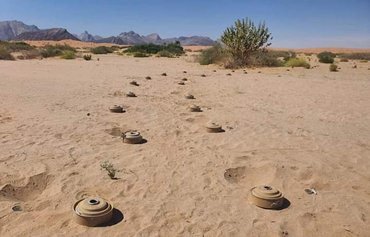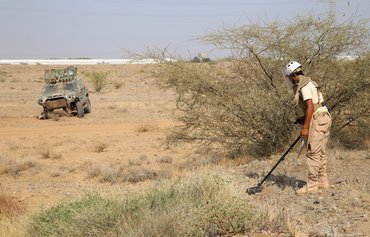Yemeni human rights activists and officials have called out the Iran-backed Houthis (Ansarallah) for their continuing use of anti-personnel mines, which are banned under international law.
Yemen is one of the 164 states that signed the Convention on the Prohibition of the Use, Stockpiling, Production and Transfer of Anti-Personnel Mines and on their Destruction, known as the Ottawa Treaty, which went into effect in 1999.
But the Houthis are still deploying these outlawed devices, which can kill or maim civilians who stumble upon them as they go about their daily lives.
In April 2017, Human Rights Watch (HRW) said the Houthis' use of banned anti-personnel landmines in Yemen had caused numerous civilian casualties and hindered the safe return of civilians displaced by fighting.
HRW called on the Houthis to "immediately cease using these weapons", which had been planted in at least six governorates since March 2015, noting that landmines continue to pose a threat to civilians long after a conflict ends.
Mines planted by Houthis have left 814 people permanently disabled, of whom 374 required amputation, according to Human Rights Minister Mohammed Askar.
The negative impact of landmines and the psychological, physical and economic damage they cause is more severe than that of war in general, human rights activist Abdul Rahman Berman told Al-Mashareq.
"The impact of war on people's lives may last for a few years after the war comes to an end, while the impact of anti-personnel mines continues to agonize their victims for decades," he said.
"Yemen will suffer for many years from the Houthis’ use of mines," he added.
The Houthis "are laying mines in the areas in which they have a presence" without regard for the dangers they pose to the civilian population, Berman said. "All they care about is to stop the advance of the national army."
'Willful destruction'
The Houthis are planting mines with the aim of "willful destruction and killing", political analyst Waddah al-Jalil told Al-Mashareq.
The militia is planting them in areas under its control in which it faces popular resistance, he said, "to retaliate against the populations of those resistance areas and turn their future into a pile of destruction, devastation and death".
The planting of mines prevents people from living normally in the future, "because they will live in fear of mines, and those areas will become uninhabited as no one will dare to work, live or even walk in them", he said.
The Houthis are planting mines "without drawing maps, so if they are forced to withdraw, the location of the mines would remain almost unknown", he added.
International humanitarian law calls on all parties of an armed conflict to spare civilians from harm, said Ishraq al-Maqtari, a spokeswoman for the National Committee for the Investigation of Human Rights Violations.
"These obligations were affirmed by the Ottawa Treaty, which was ratified by Yemen, one of the first countries to declare its commitment not to use, stockpile, transfer or manufacture anti-personnel mines," she told Al-Mashareq.
The national committee investigates the use mines in Yemen, she said, and has been working to account for all the victims of mines and to analyse the sites where mines were planted in order to identify the perpetrators.
These actions "are intended to protect the rights of the victims", she said.
This is done via intensive efforts to "investigate the facts, build a comprehensive national database of all mine victims and create individual files for each victim detailing all the information and legal responsibility", al-Maqtari added.

![A Yemeni fighter loyal to Yemeni president Abd Rabbu Mansour Hadi holds a landmine at a position which was taken from the Houthis in a mountainous region northwest of Taez on April 20th, 2017. [Saleh al-Obeidi/AFP]](/cnmi_am/images/2018/05/25/12803-Yemen-Houthi-landmines-600_384.jpg)






